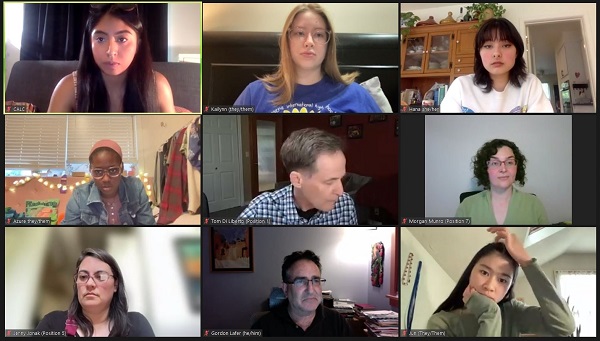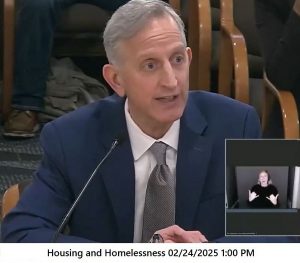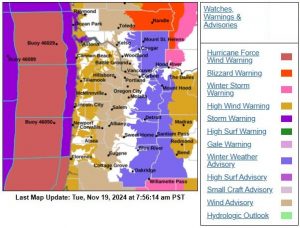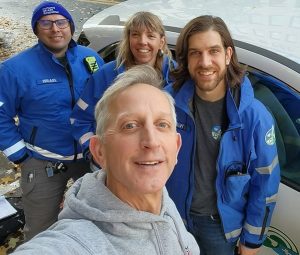Meet the candidate: Gordon Lafer
14 min read
[00:00:00] John Q: At the Community Alliance of Lane County youth-led forum, school board candidate Gordon Lafer.
[00:00:05] Gordon Lafer (4J school board candidate): Hi. I’m Gordon Lafer. I’m the father of an 11th-grader at South Eugene High School, and I’ve learned a lot from my daughter and her friends. I’m a professor of the U of O where I lead the Labor Center and also work with the National Education Policy Center. So I’ve been on the school board for four years and I’m now running for reelection.
[00:00:24] I joined the school board out of combination of interest in education policy and watching my own daughter and her friends go through school. I will never run for another office. I know there are people who run for school board as a stepping stone to something else. My only interest is in trying to make things a little better.
[00:00:41] There are a lot of big problems in my first term. There were a few things that I was happy to have been able to do. The first thing that I won was a policy guaranteeing free pads and tampons in middle school and high school bathrooms, which you would think would be a no-brainer, and take 15 minutes and be done, and instead took almost six months of activism working primarily with student leaders in the Period organization and in the feminist union in all the high schools who came repeatedly to testify at the board and went to the press and took a long time to eventually.
[00:01:13] We succeeded in winning a unanimous vote to create that policy at the board.
[00:01:17] And this is an aside, but I would just say there’ve been times when students on the board have been encouraged to only talk about like, you know, prom and homecoming. And I think to the extent to which there’s more student activism focused on changes that students want to see, it’s good for the board and good for the district.
[00:01:33] One of the other things I was happy to work on is putting librarians back in low-income elementary schools. We have zero librarians in middle schools and until, and for 20 years, we also had zero in elementary school. This was in first year that we got funding.
[00:01:49] We, we passed a policy to put three librarians into elementary schools and they’re all in some of the lowest income schools. And you know, we, the board and the district spends a lot of time talking about how to teach kids to read, and I think not enough focus on how to create pleasure in reading. And part of why librarians are so important is if you come into a librarian and you’re like, I only care about, graphic novels about animals and space or something.
[00:02:13] They have books for you to read. And you see the number of books that people read by choice.
[00:02:18] Azure (North Eugene): Hello, I’m Azure from North. We are seeing issues with transparency in board members making decisions without listening to our student body or staff. More specifically, students and staff have felt like the district has rushed through new high school schedule without much transparency. The first question is, how do you plan to prevent the district from making hasty decisions where students and staff feel unheard? Gordon, you’re up first.
[00:02:45] Gordon Lafer: Okay. First of all, I think that we need to slow down the high school schedule. I think the idea of the high school schedule was a good idea, but I think to make it work requires really intense planning. That hasn’t been able to happen this year, and I think we need to slow down the implementation of that and do it in a small set this year and then do other things later.
[00:03:06] I think there’s a long history of— First of all, if students having more or less no voice or kind of token voice come to give us something we’ll call input and then ignore. And for staff as well. When I first joined the board, there was a rule that no board member was allowed to talk to any employee of the district without going through the superintendent.
[00:03:26] And we fortunately changed that and there was a gag rule. This was one of the things, I’m not trying to say we got all these things and therefore everything is good, but we spent months just getting the right that if parents or a student ask a teacher, ‘Do you think it would be good for me to participate in standardized tests?’
[00:03:43] That the teachers allowed to give their honest, professional opinion. Before that, there was a gag rule where they couldn’t. So I think that we should have certain kinds of veto power. Like if all of the middle school math teachers think a middle school math curriculum is no good, we shouldn’t adopt it.
[00:03:59] ‘Cause we did that in the past, adopted one over the objection of teachers and students and parents, and then five years later came back and said, ‘Oh, it turns out this was no good. We need a new one.’ And I think students need to have a more organized voice. So it’s a little hard to figure out structurally how that should happen.
[00:04:15] I think especially, on things like mental health, not just mental health services, but how can we redesign how the school day works to be less stressful and to enable more connection between students and teachers, and students and each other. Some of those answers are things that can only come from students. So I’d like to see more of that. Thanks.
[00:04:34] Azure (North Eugene): And the second part of this question is how do you plan to help ease students’ minds with this new transition? And we’ll start with Gordon.
[00:04:42] Gordon Lafer: I don’t know how to ease people’s minds with the new transition, and I think it’s still unclear how big a transition there is going to be. The original idea of this was to create more time for joint planning among teachers, was to create more time for joint planning between special education and general education teachers; to create more time for, like, to create time for dedicated time for affinity groups; to create more possibility of, like, experimental classes that could be run on what was called the flex day, on let’s say Wednesday.
[00:05:18] And I think all of those things I thought were great ideas and part of the reason I was enthusiastic about this. I know that there are issues about having less instructional minutes and how to deal with that.
[00:05:28] I know that there are issues for some AP (Advanced Placement) classes that have to deal with that. There are also real problems with the current system that we have of people having classes where they have the first half of the class in the fall and the second half of the class in the spring and three months off in the middle, and different teachers in different parts.
[00:05:43] That I think was a really bad model. I think this is, I don’t know how to ease people’s minds, but I do think that it’s still in flux.
[00:05:51] And even though this is probably the last time that students can pay attention to things, because it’s getting close to the end of the year, this is the time for people to make their voices heard about, ‘Okay, here are the few things that really should not be happening. Here are the few things that should really be put on hold.’
[00:06:07] And to the extent that that can come through student organizations and not just individual voices, I think it carries more weight and it’s more powerful.
[00:06:14] Azure (North Eugene): I’m going to pass it to Hana from South Eugene for the next question.
[00:06:19] Hana (South Eugene): Thank you, Azure. The second question is: Whether it’s stress, anxiety, or feeling overwhelmed, many high schoolers, including myself, have struggled with mental health. Being at school doesn’t help solve these problems, and in some cases it makes them worse. It is rarely a place that inspires learning where people feel safe.
[00:06:39] It is rarely a place people look forward to going to. What will you do to make schools a better supportive, more welcoming place where people want to go?
[00:06:49] Gordon Lafer: I think this is the single most important question for us, and I don’t think the district has a real strategic plan around this and I don’t, I think it’s hard to have one. I think, you know, as Jenny said, we obviously need more counselors and the ratio of counselors to students is far from the needs.
[00:07:04] But I also think we need to look at what are the things we can change in the way school works in a day-to-day way that makes it less stressful and more relationship building. Smaller classes is probably the single most important thing. I think we need a lot less standardized testing, which both waste time and squeezes out everything that’s not reading in math. I think we need less homework.
[00:07:27] I think we should have longer lunch periods so people can eat and socialize. And I think we need more experimental classes that are like hands-on classes where you can use both your hands and your mind. I think of the integrated outdoor program at South and the construction program where students are learning construction trades by building tiny houses for unhoused people.
[00:07:46] And part of that is what the work is like, and part of it is having a project that you do in a team as opposed to most of school where everybody’s in competition with everybody else and isolated. We could do a lot more of that. I think we have to take bullying and racism and transphobia and other kinds of bigotry really seriously.
[00:08:06] And I think there are some good Courageous Conversations classes, but too often equity gets treated as like, ‘Okay, we’re going to check the box. We’re going to do a little thing,’ and we need to say, ‘We’re going to really carve out serious time and attention to try to do that in a serious way.’ Not so we can say, ‘Oh yeah, we did it, it’s not our fault.’
[00:08:23] But to do that in a serious way and I guess I’ll stop there. I think my time is up.
[00:08:26] Hana (South Eugene): Your next question is from Kailynn, from Sheldon.
[00:08:30] Kailynn (Sheldon): Thank you Hana. All students deserve to feel safe and have a positive environment surrounding them, but that doesn’t always happen. It is especially hard for trans students and students of color. Clubs created in search of community are not met with funds, students of color are not advocated for, and when reports of racism are made, there is insufficient attention from admin or unsatisfactory punishment.
[00:08:53] In addition, many trans students feel more comfortable using gender-neutral bathrooms that are equal to their peers. However, currently most schools only have one and or the bathroom is shared with staff. These bathrooms are often vandalized and generally inaccessible. What is your plan to ensure that equity efforts within schools specifically include, advocate, and create community and support for students of color and trans students? Gordon, you’re up.
[00:09:19] Gordon Lafer: Thanks. I think, first there’s a transparency thing here, which I think is reporting the level of hate speech and bullying, bigotry actions or whatever has to be more public. I was in a meeting recently and one of, one of the people on diversity staff at the district said, ‘Do you know there was (I forget the number) 165 incidents or something in the last term?’
[00:09:38] I said, ‘No, those numbers never came to the board.’ I think there’s a desire to pretend that problems are less than they are, and that doesn’t help us. The extent and urgency of the problem has to be public. I do think we need to increase funding for affinity groups. I think there are some things working well, I would say like the Gakuen program at Kelly, that we should look to expand.
[00:09:57] I also think we need to have clear standards for what happens when something like this happens in school. Like, it can’t be that each individual teacher or principal or librarian on their own is supposed to decide what’s the appropriate response. And I know we’ve had a lot of talk about having restorative justice and transformative justice and all of that, I think would be good.
[00:10:16] But I think first things first that students need to know that the district has their back and that some kinds of things hopefully are not going to be tolerated. I think we clearly need more gender-neutral bathrooms. I also think we should be teaching classes on gender in every grade in middle school and high school.
[00:10:33] We should teach gender like we teach math and English. First of all, most people (to speak for myself and my friends) are like thinking about gender all the time anyway. We might as well teach something that is real in people’s lives and people are interested in. And I think just learning, not just about identity, but how to grow up, how to be a decent person. I think we should be teaching classes on gender as a central part of our curriculum.
[00:10:48] And then, last thing I would say that you didn’t ask about, but in terms of neurodiverse students, I think it’s critical that we move away from a behavior modification model towards a relational model of integrating neurodiverse students into classes. Thanks.
[00:11:11] Azure (North Eugene): I’m in sixth grade and would like to be able to take a Courageous Conversations class and for my teachers to take it too. What can the district do to make these opportunities more available? Gordon?
[00:11:22] Gordon Lafer: Thanks. We have started this in the district. We actually have one of the national experts in Courageous Conversations, a woman named Leah Dunbar, who works for the Lane Educational Service District, who’s now working with four teachers in different high schools to run Courageous Conversations classes.
[00:11:38] Not as a two-day thing, but as a full term class. And I think part of that also is having those teachers work together as a cohort and meet periodically among themselves. something like this, especially, you can’t teach it in a formulaic way and get a canned curriculum and say, ‘Here’s what you’re doing on day one in minute one.’
[00:11:56] It takes some heart and it takes some art. And I think in that way when we say, you know how we want this to be much, much bigger, we need to grow it in a serious way, which means finding teachers who are interested in building cohorts. I would say that we should be doing this on lots of topics, but especially this, when you look at what’s the difference between a Courageous Conversations class that really, the people actually get changed, and a thing like so many other things that like you sit through and you check the boxes and you whatever, and you come out of it unchanged.
[00:12:24] I also think that means that we as a district need to make a commitment to it. You’re not going to get AP credit for Courageous Conversations, and it’s not on the standardized test and all that kind of thing.
And that means that we need to make a commitment to funding it, to giving cohorts of teachers the time and support to developing and to put it into the schedule. So I think there’s not a quick answer to how to ensure that a sixth grader can get it in a given class, but I think there is a deliberate way to grow it from where we are now. Thanks.
[00:12:53] Hana (South Eugene): We actually have time for one last question, so I’m going to hand it over to Jun to ask that question.
[00:13:01] Jun (Churchill): All right. You’re only going to have one minute, but what is your view on supporting teacher creativity and innovative curriculum development as a way to promote equity and student well-being? We’ll start with Gordon.
[00:13:12] Gordon Lafer: I’m 1000% for that. When I first ran for the board, I met with one of the people who created the integrated outdoor program at South, which is a combination of physical education and English that has been great for 15 years. And they said, you know, the stupid thing the district could do is to say, ‘This is working well, let’s do this at all the schools.’
[00:13:31] What you have to do is find the things that teachers are passionate about at other schools, and there are so many things and so many community partnerships that we could be doing that would be more interesting than the stuff we’re doing now.
[00:13:42] And we’d need to both to treat teachers, you know, to tap into teachers’ creativity and passions, to create a wide variety of classes so that, you know, when we were talking about mental health and people said how important it was to have at least one thing during the day that they were looking forward to, one class where they connected to people. I think this is a critical direction for a district to go in. Thank you.
[00:14:05] Azure (North Eugene): We’re going to move on from the Q&A to the next segment, so, Hana.
[00:14:10] Hana (South Eugene): Thank you, Azure. We’re now going to move on to our closing thoughts. Each candidate will have one minute to share their closing thoughts. In your response, please state one word that represents your purpose for running for school board. You may use the remainder of your time to explain your choice of that word. For example, our word to describe our purpose for this forum is ‘voice,’ to ensure student voices are heard. Gordon, what’s your word?
[00:14:36] Gordon Lafer: I’m going to say my word is ‘alive,’ but my explanation is just because I think too much of school is just boring and soul-deadening and makes people feel like failures. And what we want is not a particular subject matter that people need to learn, but just to feel like the world is full of weird and wonderful things, and that people are capable of exploring them.
[00:14:56] The key to everything we’re talking about is having the richest people and biggest corporations in the state pay their fair share of taxes so schools can be fully funded. The overcrowded classes ruin everything.
[00:15:07] And even when we were talking before about, we want a system where people have real information and we have deliberative careful conversations about how things are going to go, you can’t do that when you have a system where everybody is doing more than one person’s job because they’re all stretched too thin.
[00:15:21] So that’s a statewide fight, but I think the school board has to help lead on that for long-term solutions. Thanks.
[00:15:27] John Q: 4J candidate Gordon Lafer is seeking re-election May 16.







